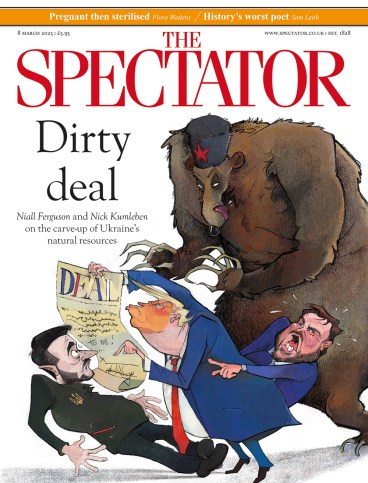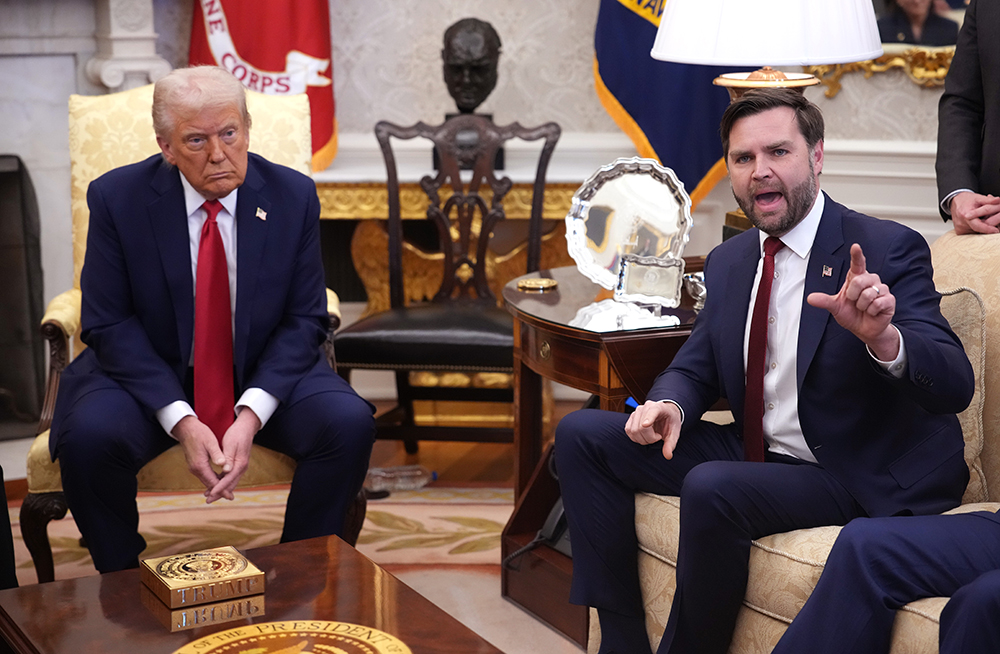
Just before Russia invaded Ukraine three years ago, Vladimir Putin and Xi Jinping announced a ‘friendship without limits’. The phrase seems to apply equally well to Vladimir Putin and Donald Trump. Has Trump ever breathed a word of serious criticism of Putin, questioned his democratic mandate, challenged his right to invade an independent country, condemned his kidnapping of children? Before his inauguration, Trump stepped in on behalf of ‘the hostages who are being held so violently, inhumanely and against their will in the Middle East’. He warned Hamas that there ‘would be ALL HELL to PAY’ for the perpetrators and that they must ‘RELEASE THE HOSTAGES NOW!’. But although Ukraine is, like Israel, the victim of unjustified attack and terrible atrocities, in Trump’s mind Volodymyr Zelensky is the dictator and warmonger. He is trying, in effect, to foment a coup against him. At the UN Security Council last week, resolution 2774 avoided all condemnation of Russia and any assertion of Ukraine’s sovereignty, calling merely for a ‘swift end to the conflict’ and ‘a lasting peace’. The United States and China voted with Russia. Britain, France, Denmark and Greece – all Nato members – abstained. Thus is western diplomacy being dismantled.
What else might follow? Britain is a member of the Anglosphere’s Five Eyes intelligence-sharing alliance. Can we be confident that our secrets will not be shared with Russia by the leading pair of eyes? Britain is also a nuclear power. But our nuclear posture and the weapons themselves are constructed round American cooperation, know-how and trust. Between them, America, Russia and – though way behind – China have more than 90 per cent of the world’s nuclear weapons. Trump’s concept of ‘peace’, which he hailed to Congress on Tuesday, seems to mean the triumph of the stronger power in any conflict. Margaret Thatcher’s mantra of ‘not just peace – but peace with freedom and justice’ is anathema to him. Perhaps the simplest answer to why Trump likes Putin is that Russia has more than 1,600 deployed nuclear warheads. Britain has fewer than 250. In the past, that disparity encouraged the United States and Britain to stick together. Today, it encourages America to switch sides.
There has been some tut-tutting about Zelensky’s handling of the famous Oval Office encounter. But look at it from his point of view. He could not refuse the meeting since this was his chance to reach a huge global audience with his country’s case. He also had to speak in English, though his is imperfect, in order to address the world unmediated. It was clear from the way Trump and J.D. Vance structured the meeting that it would ‘go well’ only if Zelensky agreed to everything. Any disagreement would be jumped on. But how could Zelensky not disagree? He had to speak for the nation he leads. That is his job.
As I watched Trump and Vance bullying Zelensky, I was reminded, ludicrously, of something that used to happen to new boys at Eton. We had to pass a ‘colours test’, an oral quiz on facts about the school, conducted by the senior boys in each house. Mine, which was typical, went like this. I knocked on the door of the ‘library’, the prefects’ lair. ‘Wait!’ they shouted and began to beat the chairs with canes which in those days could be purchased from the ironmonger’s in the high street. As they did so, they emitted cries of fake pain, as if someone was being actually beaten. ‘Come in!’ I entered. ‘DON’T stand on the carpet!’ I had no choice, since it was fitted wall to wall. The test began. ‘Where’s m’tutor’s [Eton word for housemaster] prick?’ asked one beefy six-footer (I was 12 years old and 5ft 1in). ‘In his trousers,’ I surmised. ‘No!’ he shouted: ‘It’s in the dame [Eton word for matron].’ There followed some desultory questions about the school’s geography, house colours etc, most of which I got right. I was duly failed, because it was a thing understood that you would be failed first time, especially if you knew the answers. Next time round, there was less bullying and I passed. Trump and Vance appear to be playing comparable mind games. I suppose it is on such a basis that people like Lord Mandelson are urging poor Zelensky to go back for more, with his tail between his legs. Hence his letter to Trump.
Of the two bullies, I feel Vance is the more repulsive – the toadying theorising propagandist, flattering his way into being the big boss’s anointed heir. What a fall from his time as the eloquent voice of voiceless America.
On Monday, while Sir Keir Starmer was discussing all these matters in ‘the other place’, we in the House of Lords were debating the abolition of the 92 (now fallen, by ‘natural wastage’, to 88) hereditary peers. We noticed this contrast and it was deplored on all sides. But the government deserves the blame. The abolition of the hereditaries is the only thing in the bill, the last vestige of the grand plans for Lords reform which Labour from time to time touts but never dares enact. As a piece of legislative wisdom, it is about as useful as announcing a massive upgrading of our defence capacity and then doing nothing but getting rid of the Brigade of Guards. The most surprising speech was the most effective. This came from a life-peer, Lord Shinkwin, who is quite severely disabled, having been, as he explained, ‘born with a broken leg and spent much of my childhood in hospital’. He is small, and so the microphones suspended from the ceiling had difficulty picking up his voice. This effect helped him, because we listened in perfect silence, straining to hear. ‘I know what discrimination looks like,’ he said,’ and I see discrimination in this bill’: the hereditaries were being told that ‘their contributions are invalid and valueless by virtue of their being the wrong sort of Peer’. It was a rebuke that the government did not answer, because it could not.








Comments